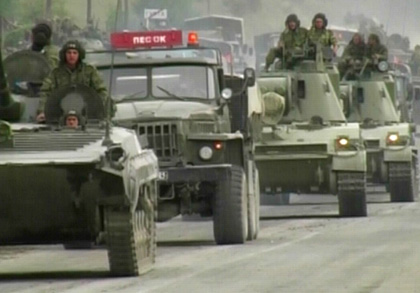
Dimitri Simes, President of the Nixon Center, was one of the leading foreign policy experts in Washington to predict some kind of hot clash between the former Soviet state of Georgia and Russia involving the autonomous provinces of South Ossetia and Abkhazia at the time Kosovo declared its independence. My colleague Anatol Lieven was another.
In coordination with The National Interest, I have asked Simes to offer guest commentary here at The Washington Note on what many Georgians and Russians are calling a “war”. I expect to post his thoughts on Monday.
My own view is that the U.S. has displayed a reckless disregard for Russian interests for some time. I don’t like Russia’s swing to greater domestic authoritarianism and worry about its stiffened posture on a number of international fronts — but Simes convinces me in his important Foreign Affairs essay, “Losing Russia,” that much of what we are seeing unfold between Russia and Georgia involves a high quotient of American culpability.
When Kosovo declared independence and the US and other European states recognized it — thus sidestepping Russia’s veto in the United Nations Security Council — many of us believed that the price for Russian cooperation in other major global problems just went much higher and that the chance of a clash over Georgia’s breakaway border provinces increased dramatically.
By pushing Kosovo the way the US did and aggravating nationalist sensitivities, Russia could in reaction be rationally expected to further integrate and cultivate South Ossetia and Abkhazia under de facto Russian control and pull these provinces that border Russia away from the state of Georgia.
At the time, there was word from senior level sources that Russia had asked the US to stretch an independence process for Kosovo over a longer stretch of time — and tie to it some process of independence for the two autonomous Georgia provinces. In exchange, Russia would not veto the creation of a new state of Kosovo at the Security Council. The U.S. rejected Russia’s secret entreaties and instead rushed recognition of Kosovo and said damn the consequences.
Now thousands are dead. The fact is that a combination of American recklessness, serious miscalculation and over-reach by Georgian President Mikheil Saakashvili, as well as Russia’s forceful reassertion of its regional national interests and status as an oil and gas rich, tough international player means America and Europe have yet again helped generate a crisis that tests US global credibility.
I think that Saakashvili who has been agitating for Georgia’s membership in NATO just lost his chance with his own reckless behavior. Saakashvili’s decision to send tanks into South Ossetia gave Russia the trigger that it may have wanted to send in more of its own troops and weapon systems. Russia was ready. Putin, now prime minister of Russia but still the center of power, was relaxing and chatting with George W. Bush in the bird’s nest Olympic stadium in Beijing looking quite in control and confident.
It is possible that Condoleezza Rice’s July 10th visit to Tbilisi and joint press conference with Saakashvili was interpreted by him that American power and resolve were firmly behind Georgia and its intention to reassert control over the autonomous provinces. The Georgian president miscalculated about American power in the world today and our resolve to take on Russia directly — no matter how much the Washington Post‘s Fred Hiatt and Anne Applebaum would like to see the situation differently.
While the seeds of this conflict between Georgia and Russia had been planted long ago, the U.S. helped engineer events that are now undermining its own interests and the global perception of American power.
When the media report on what drove this “war”, commentators should look to Kosovo as well as Saakashvili’s own recklessness and overconfidence to further understand the reasons why tanks from both sides rolled into South Ossetia.
— Steve Clemons
Update: Richard Byrne has more informed thinking on the parameters of this clash.


87 comments on “Georgia-Russia Clash: American Culpability and the Kosovo Connection”